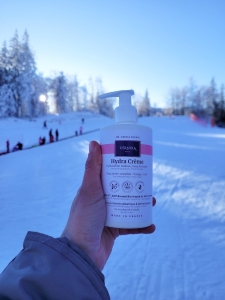Reading Time: mins
Exposure to the sun is essential for good health, especially for the synthesis of vitamin D. However, for babies, whose skin is extremely sensitive and thin, protection from the sun is crucial to avoid serious risks. From selecting the right suncare products to adopting protective behaviors, this article provides a comprehensive overview of the steps you can take to effectively protect your baby's skin in the sun. By choosing natural products and following the right advice, you can greatly reduce the threat posed by UV rays.
A baby's skin is up to five times thinner than an adult's, making it particularly vulnerable to external aggressors such as ultraviolet (UV) rays. Excessive exposure to the sun during childhood significantly increases the risk of developing serious skin conditions later in life, including melanoma. So learning how to effectively protect your baby's skin is crucial to his long-term health. By providing valuable information and focusing on safe, natural products like those offered by Vernixa, this article aims to educate and reassure parents.
Babies' particularly sensitive skin requires special care and protection against UV rays. These rays can cause painful sunburns and increase the risk of skin problems later in life, including skin cancer. Babies' increased sensitivity to the sun's harmful effects is due to their reduced production of melanin, the natural pigment that protects the skin against UV rays. So parents need to take a proactive approach to sun protection for their children.
Given babies' vulnerability to UV rays, it's essential to limit their direct exposure to the sun, especially during the sunniest hours of the day. However, when sun exposure is unavoidable, choosing the right suncare products becomes crucial. Suncare products for babies must offer effective protection while being gentle on their delicate skin. This underlines the importance of selecting products containing mineral rather than chemical filters, to avoid any irritation or allergic reaction.
Mineral filters are preferable for babies' sun protection because of their ability to form a physical barrier that reflects UV rays, rather than absorbing them. This type of protection avoids the risks of irritation common with chemical filters, which is essential for the cutaneous well-being of the smallest children.
Babies' delicate skin requires specially adapted care, free from irritating substances such as perfumes, alcohol and allergens. Since baby's skin is particularly receptive to applied products, choosing gentle, natural formulations is crucial. Vernixa is committed to formulating products that respect babies' sensitive skin, excluding any ingredients likely to cause irritation or reactions.
Moisturizing is crucial for baby's skin, especially after exposure to the sun. Skin exposed to UV rays can quickly become dry and irritated. Using products enriched with natural, moisturizing ingredients helps restore moisture and repair sun damage. After-sun care plays an important role in maintaining healthy, resilient skin in the face of external aggression.
It's advisable to restrict outings with your baby to less sunny periods of the day, typically before 10 a.m. in the morning and after 4 p.m. in the afternoon. When exposure to the sun is unavoidable, it's imperative to take appropriate protective measures, including the use of covering clothing and the regular application of suitable sun cream.
The choice of covering clothing, such as long-sleeved shirts, pants and wide-brimmed hats, is an effective method of protection to minimize exposure of babies' skin to the sun. Lightweight, light-colored fabrics offer additional protection by reflecting the sun's rays rather than absorbing them. So dressing your baby wisely is an essential step towards optimal sun protection.
Regular application of sunscreen to exposed areas of skin is crucial. We recommend choosing products specially formulated for children's sensitive skin, and reapplying every two hours, or after every swim. By adopting these practices, you'll maximize the effectiveness of sun protection while respecting the sensitivity of your baby's skin.
Protecting your baby's skin from the dangers of the sun is a crucial responsibility for every parent. Thanks to a rigorous selection of suncare products, and by following best practices, you can ensure effective, safe protection for your baby's sensitive skin.
All Rights Reserved | Tous Droits Réservés GTIN Compliance Hydra Lavant | GTIN Compliance Hydra Crème



